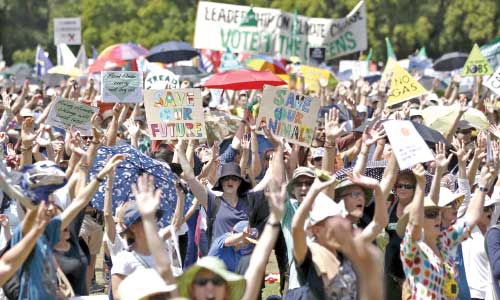Violence has cast a long shadow over a climate summit opening in Paris on Monday, two weeks after 130 people were killed in a coordinated jihadist onslaught on the French capital.
As more than 150 world leaders prepared to meet under heightened security, analysts warned of an increasingly war-torn future facing humanity if they fail to limit global warming.
The Paris attacks on November 13 were claimed by the Islamic State group that has a brutal war in Syria – a conflict rooted in part, experts say, on an historic drought from 2006 to 2010.
It drove some 1.5 million farmers and herders off their land and into cities and towns like Homs, Palmyra and Damascus.
It’s not a coincidence that, immediately prior to the civil war in Syria, the country experienced the worst drought on record, US secretary of state John Kerry said in Milan last month.
According to Francesco Femia of The Centre for Climate and Security in Washington DC, research has shown the Syrian drought was made two-to-three times more likely because of climate change.
Many a report has suggested that water scarcity, exacerbated by global warming, has fuelled deadly conflicts in the Middle East and Africa, thus contributing to the flood of refugees seeking a better life in Europe and elsewhere.
Experts warn the situation is likely to worsen as climate conditions become more hostile to human survival – and people become more desperate.
While climate change is not, on its own, a direct cause of conflict, competition for dwindling water and land resources can certainly fan flames in an already volatile situation, say analysts.
Climate change is a ‘threat multiplier’, Femia said.
If, in a certain place, you introduce climate stress to the kinds of natural resource deficiencies that can contribute to state failure or conflict, you increase the likelihood of a conflict occurring.
In July, an international team of scientists, policy analysts, financial and military risk experts, cautioned that food and water shortages would boost future conflicts over resources, mass migration and state failure.
Even sophisticated governments may be unable to deal with the combination of pressures, said the report entitled Climate Change, a Risk Assessment.
The expansion of ungoverned territories would in turn increase the risks of terrorism, with large numbers of marginalised and disenfranchised people to recruit from, said the report compiled for policymakers.
Negotiators from 195 nations will gather in Paris until December 11 to craft a pact to stave off worst-case-scenario climate change by limiting emissions of climate-altering greenhouse gases.
As more than 150 world leaders prepared to meet under heightened security, analysts warned of an increasingly war-torn future facing humanity if they fail to limit global warming.
The Paris attacks on November 13 were claimed by the Islamic State group that has a brutal war in Syria – a conflict rooted in part, experts say, on an historic drought from 2006 to 2010.
It drove some 1.5 million farmers and herders off their land and into cities and towns like Homs, Palmyra and Damascus.
It’s not a coincidence that, immediately prior to the civil war in Syria, the country experienced the worst drought on record, US secretary of state John Kerry said in Milan last month.
According to Francesco Femia of The Centre for Climate and Security in Washington DC, research has shown the Syrian drought was made two-to-three times more likely because of climate change.
Many a report has suggested that water scarcity, exacerbated by global warming, has fuelled deadly conflicts in the Middle East and Africa, thus contributing to the flood of refugees seeking a better life in Europe and elsewhere.
Experts warn the situation is likely to worsen as climate conditions become more hostile to human survival – and people become more desperate.
While climate change is not, on its own, a direct cause of conflict, competition for dwindling water and land resources can certainly fan flames in an already volatile situation, say analysts.
Climate change is a ‘threat multiplier’, Femia said.
If, in a certain place, you introduce climate stress to the kinds of natural resource deficiencies that can contribute to state failure or conflict, you increase the likelihood of a conflict occurring.
In July, an international team of scientists, policy analysts, financial and military risk experts, cautioned that food and water shortages would boost future conflicts over resources, mass migration and state failure.
Even sophisticated governments may be unable to deal with the combination of pressures, said the report entitled Climate Change, a Risk Assessment.
The expansion of ungoverned territories would in turn increase the risks of terrorism, with large numbers of marginalised and disenfranchised people to recruit from, said the report compiled for policymakers.
Negotiators from 195 nations will gather in Paris until December 11 to craft a pact to stave off worst-case-scenario climate change by limiting emissions of climate-altering greenhouse gases.
Source: New Age










